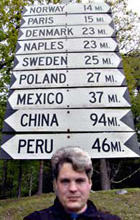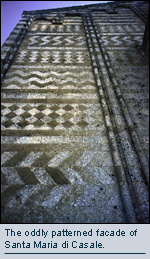Subscribe to the blog 
|
 |
 |
 |
 |
 |
Find a Flight Consider a Consolidator Rent a Car Pick a Railpass Book a Vacation Reserve a Room Get Gear |
|
||||||
|
Brindisi, Waiting Room of the Aegean (cont'd) << back On the way back into town, my bus conveniently pauses for a minute right next to the Arabo-Norman Fontana Tancredi, built in 1192 by Tancred, the region's last Norman king. After praying at Santa Maria, so local legend goes, the nervous Christian soldiers stopped here to water their horses and steel their courage for the coming Crusade. I snapped a picture, but only at the last minute as the bus pulled away. The problem is I was staring in the other direction, up the western antler of Brindisi's bay, where I could see the Norman-era Castello Svevo poking up from a headland in the harbor. These days, the only crusade on people's minds is finding a better beach. Brindisi's modernized streets teem with legions of holiday-makers who are abandoning Italy for the Mediterranean and Aegean Seas and their storied isles. At least, they were teeming when I left for the church outside town. By the time I get back into Brindisi proper, the town is in full-blown riposo mode. Riposo in Brindisi is still observed as a religion, and everything but everything shuts down for a three- to four-hour stretch of mid afternoon. Shops are shuttered. Sheets of newspaper blow through the streets like urban tumbleweed. Even the fountains are turned off. Every last local soul disappears behind doorways hung with strings of beads, with only the clink of forks on plates and thunk of glasses set on tables to hint that anyone is actually inside. Of course, this doesn't account for all the visitors, who arrive in droves beginning early in the morning, only to discover, as I once did as a traveling student, that the ferries don't leave until around 9 or 10pm. So they wait. Most of the backpackers spend the afternoon like August dogs collapsed in the shade, draped across the benches around a fountain, or pigeonholed into shop doorways, snoozing, panting, and keeping a wary eye on the streets where few people but we nutty travel writers with schedules to keep and research to conduct are walking about. In fact, when I arrive at the Hotel Europa, dripping sweat and slightly out of breath from the stairs, the slightly stooped Signora Natalina looks at me as if I am crazy after I deliver my "I-am-writing-a-guidebook" speech as asks "Yes, but what are you doing out in this heat?" I shrug sheepishly "It's my job." She shakes her head, beams wreathes of smiles around an ever-present cigarette clamped between her teeth, and proceeds to chat my ear off while she struggles to check in a favorite customer (a Brit who has been returning here since his World War II days) using the computer her son insisted a modern hotel needs.
Copyright © 1998 by Reid Bramblett |

 The
castle's now under the aegis of the Italian Navy, and therefore closed
to the public. I used to get indignant about this sort of thing, but eventually
realized that there's something appropriate, even noble, about a centuries-old
fortress still serving a military purpose. And besides, Brindisi has been
a naval base from Rome's Second Punic War to the Allies' Great War. Various
popes personally saw off their Crusades from these docks (Pius II, humanist
philosopher and great patron of the early Renaissance, died here while
trying to drum up support for an aborted Crusade of his own), and even
Mussolini launched the seafaring portions of his (belated) imperial campaigns
against Ethiopia, Albania, and Greece from here.
The
castle's now under the aegis of the Italian Navy, and therefore closed
to the public. I used to get indignant about this sort of thing, but eventually
realized that there's something appropriate, even noble, about a centuries-old
fortress still serving a military purpose. And besides, Brindisi has been
a naval base from Rome's Second Punic War to the Allies' Great War. Various
popes personally saw off their Crusades from these docks (Pius II, humanist
philosopher and great patron of the early Renaissance, died here while
trying to drum up support for an aborted Crusade of his own), and even
Mussolini launched the seafaring portions of his (belated) imperial campaigns
against Ethiopia, Albania, and Greece from here.

